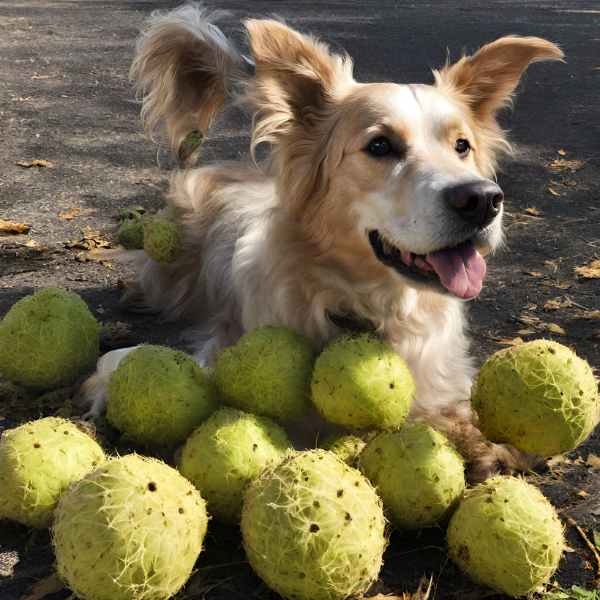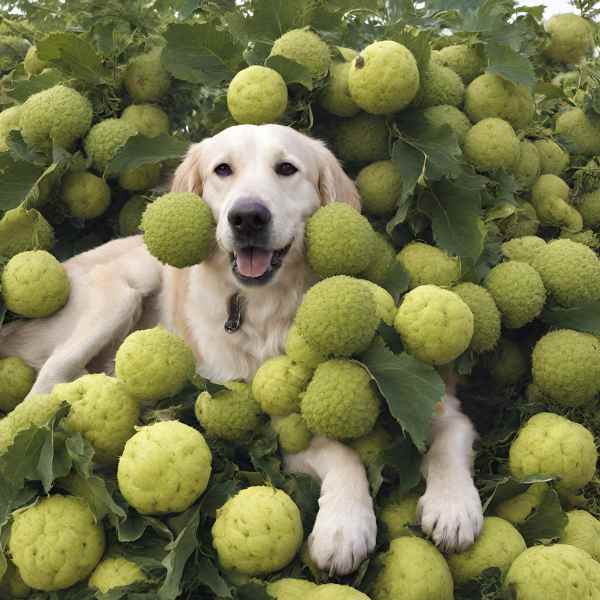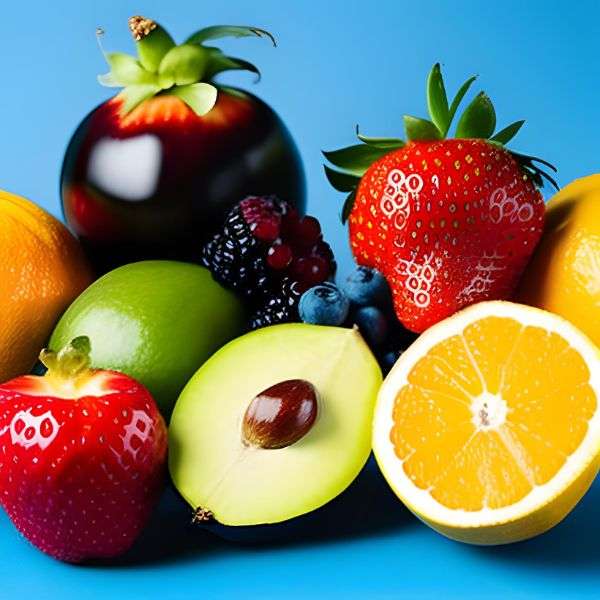Yes! Hedge apples are generally safe, but moderation is required as these fruits have lots of fiber that might upset your dog’s stomach. Even though it’s not a big risk, it’s smart to be cautious and not give hedge apples as your dog’s regular treats.
Keeping our furry friends healthy is super important. Instead of hedge apples, think about giving your dog safe fruits like apples. Apples not only taste good but also have vitamins and fiber that are good for your dog.
Always remember, your dog’s well-being comes first. Before giving them new foods, talk to your vet. Stay in the know and make sure your pet stays happy and healthy.
Nutritional Composition of Hedge Apples
Here’s a table highlighting the nutritional composition of hedge apples:
| Nutrient | Amount per 100g |
|---|---|
| Calories | 40 kcal |
| Protein | 1 g |
| Carbohydrates | 10 g |
| Dietary Fiber | 6 g |
| Sugars | 4 g |
| Fat | 0.4 g |
| Vitamins and Minerals | |
| Vitamin C | 20 mg |
| Vitamin A | 0 IU |
| Calcium | 33 mg |
| Iron | 0.6 mg |
Potential Benefits of Hedge Apples For Dogs Health

Here are some potential benefits of hedge apples for dogs:
Rich in Vitamin C:
Hedge apples contain vitamin C which is a powerful antioxidant. Vitamin C plays an important role in supporting a dog’s immune system, helping in the prevention of diseases, and promoting overall well-being.
Good Source of Fiber:
Fiber is an essential component of a dog’s diet which leads to healthy digestion and regular bowel movements. Hedge apples are relatively high in dietary fiber, which can help to regulate your dog’s digestive system and promote good gut health.
Natural Antioxidant Properties:
Hedge apples contain antioxidants that protect your dog’s body against harmful free radicals. These antioxidants can help reduce inflammation and oxidative stress and also promote a dog’s overall health.
Potential Risks and Toxicity of Hedge Apples for Dogs’ Health
It’s important to be aware of these factors before allowing dogs to have access to hedge apples.

Here are some potential risks and considerations:
Digestive Upset:
Hedge apples contain a high amount of fiber, which can lead to digestive issues, and result in diarrhea, an upset stomach, or digestive discomfort.
Choking Hazard:
Hedge apples have relatively large and a bumpy texture. Dogs may not be able to chew and swallow it directly, so this can cause choking hazards to dogs.
Obstruction Risk:
Ingesting large portions of hedge apples may increase the risk of intestinal blockage or obstruction in dogs. This causes problems if dogs chew big pieces of hedge apples that are too large to pass through the digestive system.
Allergies or Sensitivities:
Some dogs can have allergies or sensitivities to some compounds present in the hedge apples. You must notice dogs closely for any signs of allergic reactions, such as itching, hives, or digestive problems if they come into contact with hedge apples.
Unknown Long-Term Effects:
Due to the limited research available on the effects of hedge apple consumption in dogs, the long-term consequences are not well understood. As a result, you should be careful when feeding hedge apples to your dog.
Introducing Hedge Apples to Your Dog
While addressing crucial aspects like recommended serving sizes and monitoring your dog’s reaction.

Recommended Serving Sizes
Start Small: Introduce hedge apples in moderation.
Tiny Portions: Begin with a small slice or a few small pieces.
Watch and Learn: Observe how your dog reacts before offering larger servings.
Monitoring Your Dog’s Reaction
It is very important to pay attention to how your dog feels after trying hedge apples. Look out for any signs of tummy trouble, like vomiting or diarrhea. If your dog seems uncomfortable, it’s a good idea to stop giving them hedge apples and talk to your vet.
Remember, every dog has different dietary needs. Some might love hedge apples, while others may not. Always consider your dog’s health first by introducing new treats slowly and keeping a close eye on how they handle it.
When to Avoid Hedge Apples?
There are some of the signs your dog poses like allergies, sensitivities, and special health conditions in dogs, then you should avoid feeding hedge apples to your dog. Let’s discuss in detail:

Allergies and Sensitivities
Possible Risks: Hedge apples, might not be the best for dogs with allergies or sensitivities.
Be Cautious: If your dog has a history of food allergies, you should be careful when introducing hedge apples.
Keep an Eye Out: Observe closely for any signs of trouble, like itching, tummy problems, or changes in behavior.
Special Health Conditions
Not for Everyone: The high fiber in hedge apples might not be best for dogs with special health conditions, like diabetes or tummy issues.
Check with the Vet: Before adding hedge apples to the diet of dogs with specific health problems, talk to your vet. Make sure it fits their special dietary needs.
Best Alternatives of Hedge Apples for Dogs
If you want to go for alternatives to hedge apples that can be safely eaten by dogs, there are many treats to choose from.

Here are some top choices:
Apples:
Apples are a fantastic alternative to hedge apples. They are rich in vitamins, minerals, and dietary fiber. Remember to remove the core and seeds before offering slices of apple to your dog.
Blueberries:
Blueberries are packed with antioxidants, vitamins, and fiber. They can be a delicious and healthy treat for dogs. Serve them fresh or frozen as a tasty snack.
Watermelon:
Watermelon is a hydrating fruit that dogs often enjoy. It contains many minerals and vitamins and its juicy content can be very refreshing for dogs. You should remove the seeds before you give them to your dog.
Carrots:
Carrots can be excellent for dogs as they are low in calories and they they are crunchy. They are rich in beta-carotene, fiber, and vitamins. Raw carrots make a satisfying and teeth-cleaning treat for dogs.
FAQS
Are hedge apples poisonous to dogs?
Hedge apples are generally considered non-toxic to dogs. However, it’s still best to avoid their eating to prevent potential risks and complications.
What should I do if my dog eats a hedge apple?
If your dog consumes a hedge apple, monitor them closely for any signs of discomfort or adverse reactions. Contact your veterinarian for guidance, and follow their advice based on your dog’s specific situation.
Can hedge apples cause digestive problems in dogs?
Yes, hedge apples can potentially cause digestive upset in dogs due to their high fiber content. It’s good to avoid feeding them to dogs to prevent any kind of stomach issues.
What are some safe fruits for dogs to eat?
Safe fruits for dogs include apples (without seeds), blueberries, watermelon (without seeds and rind), carrots, pumpkin, and sweet potatoes. These fruits can offer many health benefits for dogs’ health and can be eaten happily by dogs.
Conclusion
In conclusion, Hedge apples are not very toxic but due to their texture and some compounds, they should not be included in their regular diet.
You can look for many other fruits that are very nutritious and tasty for dogs. Make sure you feed healthy foods to your dog to keep them healthy and fit.
If you want to about more foods for dogs, you can visit our other articles as well to get a good knowledge about different foods. Hopefully, you have gone through the entire article and this article has helped you a lot.
Happy Snacking!







